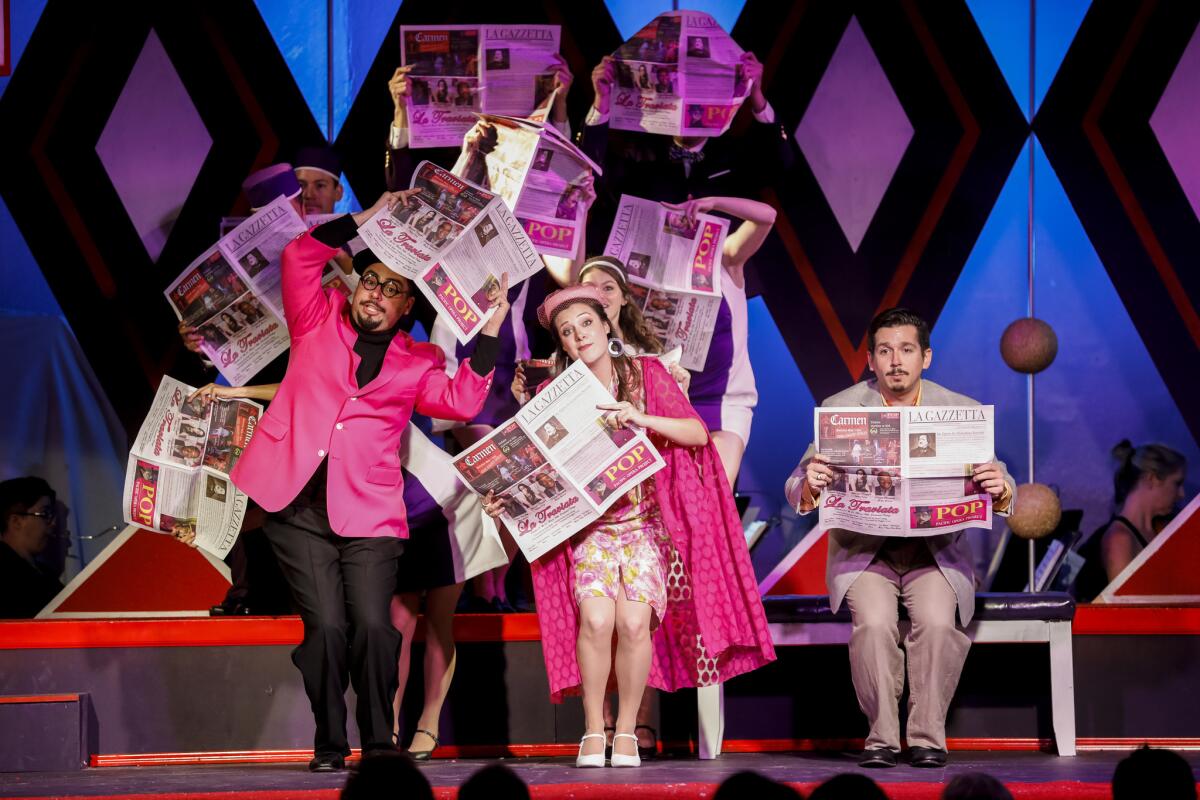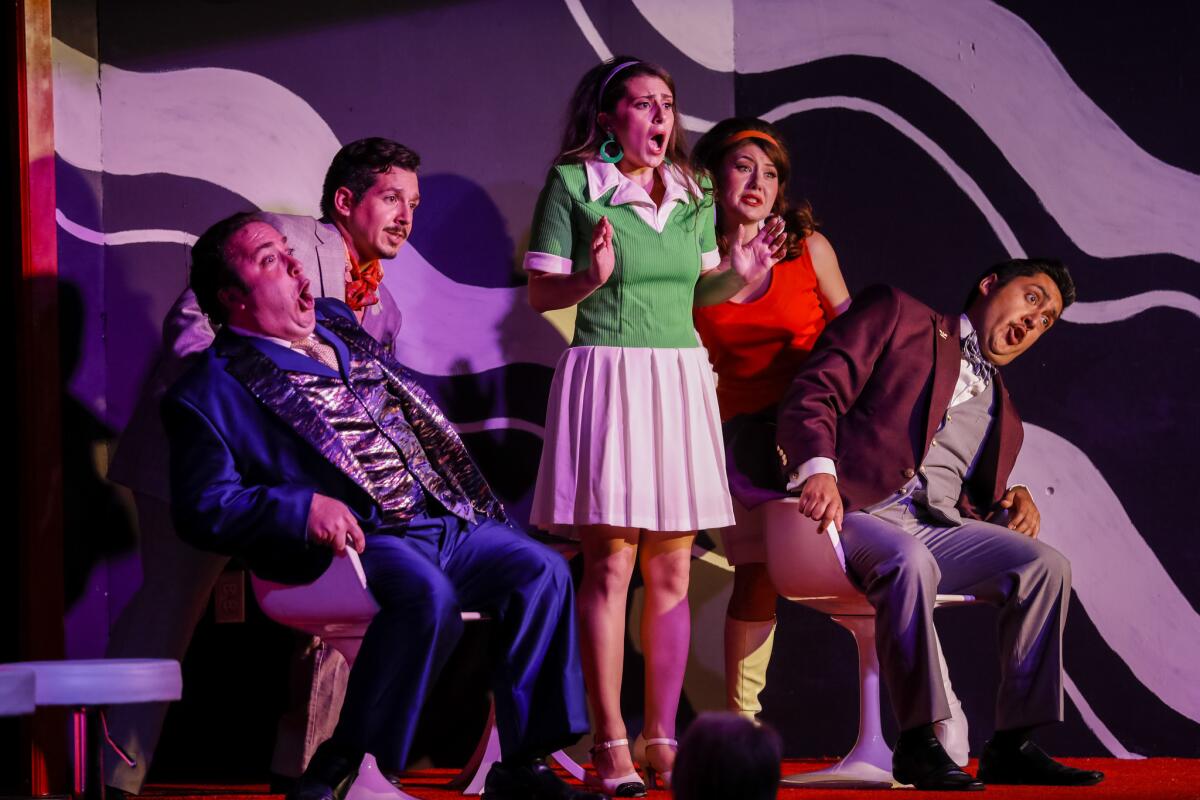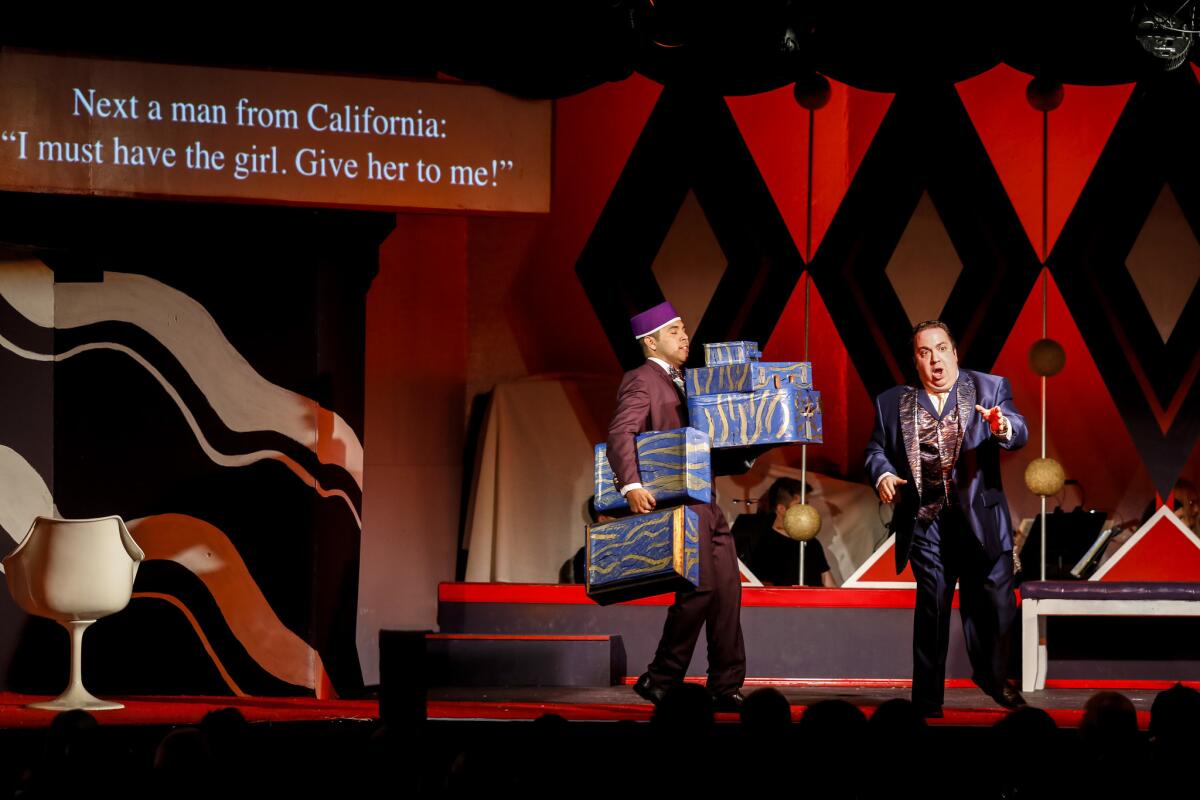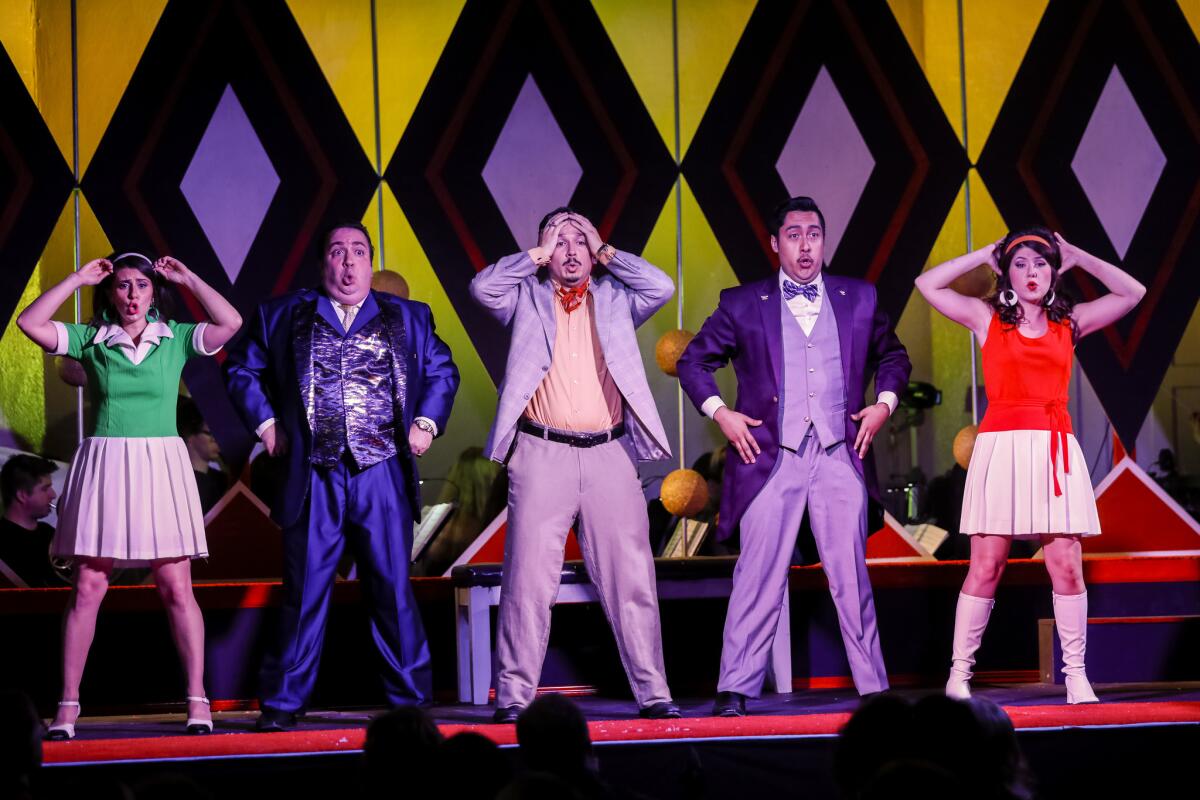Review: A little operatic help for newspapers: ‘La Gazzetta’ couldn’t be better timed

The newspaper opera is a small, obscure and super-subgenre. But it is a lively one, as Pacific Opera Project demonstrated Thursday night with a rare revival of Rossini’s little-known “La Gazzetta,” when it’s not downright subversive.
Paul Hindemith’s “Neues vom Tage” (News of the Day), which skewered modern society and included a nude bathroom scene, so enraged the Nazis that the composer high-tailed it to America before it was too late. For a jubilant scene in Philip Glass’ “Satyagraha,” the young Gandhi uses a news sheet to promote what he called satyagraha, or truth in speech, as the linchpin of the nonviolent revolution he began in South Africa.
All of this is understandable catnip to the newspaper critic. So thanks, POP, for timing — however coincidental — only the second production of “La Gazzetta” in North America just as The Times enters a new era with a new owner, new digs and new aspirations.
But, sadly, another coincidence added a shocking different significance to Thursday’s performance at the Highland Park Ebell Club, the first of five (running through next weekend). Hours earlier, a shooter in Annapolis, Md., killed five staffers at the Capital Gazette, one of the nation’s oldest newspapers.
The show must, and did, go on. While I would have liked a momentary tribute to the stalwart Capital Gazette that traces its origins back to Rossini’s time — “La Gazzetta” had its premiere in 1816 — there was also something deeply stirring about taking for granted all the clowning around a newspaper back when the very being of a publication as a requisite wellspring to society was not in question.
Rossini was a busy composer when he wrote “La Gazzetta, ossia Il Matrimonio per Concorso” (The Newspaper, or the Marriage Contest). Eight months earlier, he premiered what became his most famous opera, “Il Barbieri di Siviglia” (The Barber of Seville). A month after “Gazzetta” came “Otello,” and another month later, “La Cenerentola,” the best of all Cinderella operas. But it turned out that, in another sense, “Gazzetta” was the Cinderella of the hectic year.

In order to get through everything, Rossini borrowed from himself. The “Gazzetta” overture, for instance, was repurposed for “Cenerentola.” Ensembles from “Barbieri” were repurposed for “Gazzetta,” and so on. The plot of “Gazzetta,” taken from a commedia dell’arte play by Carlo Goldoni, is beyond crazy complicated.
A boorish nouveau riche Neapolitan merchant, Don Pomponio, comes to Paris with the intention of marrying off his pretty daughter, Lisetta, through an advertisement he puts in a local newspaper. She already loves a hotel owner, Filippo. A playboy, Alberto (whose last name is Filippo, the first of endless confusions), shows up looking for a wife. There is another father, Anselmo, with an eligible daughter, Dorlice, at the hotel. The shenanigans include a variety of mistaken identities, contrivances, duels and what not, ending in a Turkish masquerade.
Rossini’s score has many delights, especially the parodying patter ensembles that exponentially muddy already muddy waters. But the opera also has many aspects of being a rush job. Written for Naples, where Don Pomponio was a recognizable type, the opera didn’t travel well, and soon disappeared. It took a scholarly effort for the opera to finally resurface for an Italian radio performance in 1960 and begin getting a few stagings years later. But it wasn’t until a riotous 2001 Italian production by the Nobel laureate playwright Dario Fo demonstrated with vaudevillian exuberance just how searing Rossini’s satire was on society, the conventions of marriage and the idiocy of the idle upper classes, served by the gossip columnists of the indispensable gazettes.
There was something deeply stirring about taking for granted ... the very being of a [newspaper] as a requisite wellspring to society.
— Mark Swed
POP has made its reputation on just such vaudevillian exuberance, and “Gazzetta” is pretty much made for it. The company loves to perform in intimate venues such as the Ebell, where the audience can sit at tables and enjoy a bottle of wine and snacks during the performance. Sets, costumes and productions by the company’s director, Josh Shaw, are ever camp. Silliness is second nature.
With witty, succinct titles and shrewd pruning, Shaw greatly simplified the plot, making it almost follow-able if no more sensible. Mainly, though, he succeeded by making the characters recognizably modern.

Still, the main thing you come for at POP is the singing, which can be, and is in “Gazzetta,” terrific. E. Scott Levin’s Don Pomponio is someone you might have seen on Rodeo Drive, flashy and cocksure but also just as likely to trip on his own shoelaces. In a stellar performance, the baritone excavated lovable humanity.
Rachel Policar was a spectacular Lisetta, a vain shopper who also needs to, and does, rise to something higher. Kyle Patterson’s ever affable Alberto, Molly Clementz’s perky Doralice, Phil Meyer’s hilarious Anselmo and Jessie Shulman’s sagaciously flirtatious Madama la Rose all convinced. They had to, since they pretty much were singing under the audience’s noses.

Shaw’s updating to a 1963 Paris hotel worked just fine (as would probably just about any other updating). The insistence on chorus lines for ensembles proved amusing enough and musical enough if also a little forced. The orchestra, reduced to a chamber ensemble of 10, was easily overlooked most of the time, but the careful conducting of Brooke deRosa kept everything together.
The opera ends happily. A newspaper sets off a row and ultimately creates a social network. “Songs, dances, sounds and hobbies resounded around us,” the chorus sings at the end. Without knowing it, Shaw paid the ultimate tribute to Maryland and all of us, translating the opera’s last line as, “Let us never forget La Gazzetta!”
------------
‘La Gazzetta’
Where: Highland Park Ebell Club, 131 S. Ave. 57, Los Angeles
When: 8 p.m. Friday and Saturday and July 6-7 (with the final performance streamed on Facebook Live)
Cost: $15-$160 (premium table for four with wine and snacks included)
Info: (232) 739-6122 or pacificoperaproject.com
ALSO
Before ‘Hamilton,’ 100 years of American music theater and how it’s told the story of who we are
Searching for Russia’s soul, then and now, in ‘Boris Godunov’
Four radical and radically original pieces of music that blew up the modernist status quo in 1968
The new sounds of protest: Political music in the age of Trump — in Los Angeles and beyond
More to Read
The biggest entertainment stories
Get our big stories about Hollywood, film, television, music, arts, culture and more right in your inbox as soon as they publish.
You may occasionally receive promotional content from the Los Angeles Times.







